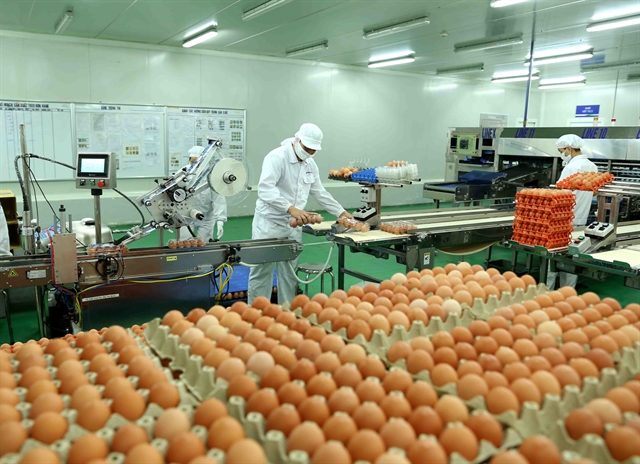Vietnam has potential to promote livestock product exports to China
Việt Nam expects livestock products to join the list of products gaining billion dollar export value, if Việt Nam can sign the protocol on poultry meat export with China, and continue to negotiate the protocol on pork export to this market, Nam said.
 |
|
Packing eggs for export at the ĐTK Phú Thọ Co, Ltd. Last year, Việt Nam exported over 34 million eggs, an increase of more than 3.1 times compared to 2022. —VNA/VNS Photo Vũ Sinh |
HÀ NỘI — Việt Nam expects its agricultural export value to China to increase sharply this year, as China agrees to review regulations permitting official exports of poultry meat from Việt Nam to this market.
Last year, livestock products accounted for only 1 per cent of the agricultural, forestry and fishery export value to China at US$12.2 billion. That was mainly due to Việt Nam not yet being permitted official exports of meat products to China.
Deputy Minister of Agriculture and Rural Development Trần Thành Nam said that with a market of 1.4 billion people, China's consumer demand for meat products is up to about $400 billion per year, so the potential for exporting meat from Việt Nam to China is many times higher than that of vegetables and fruits.
In the future, Việt Nam expects livestock products to join the list of products gaining billion dollar export value, if Việt Nam can sign the protocol on poultry meat export with China, and continue to negotiate the protocol on pork export to this market, Nam said.
For many years, most of Việt Nam's livestock products including pork, beef, and chicken and buffalo meat, have been under unofficial quotas at border gates. This export has faced border barriers, and inspection and control according to stricter standards.
At present, Việt Nam ships two products of the livestock industry to China, including bird's nests and milk, under official export according to the protocol on exporting bird's nest signed in 2022 and the protocol on exporting milk signed in 2019 between the two countries.
Thanks to the protocol, Việt Nam's exports of milk and milk products to China have grown very rapidly recent years. Those products have accounted for 93 per cent of the total export value of Việt Nam's livestock products to China.
Tống Xuân Chinh, deputy director of the Department of Livestock Production, said that in 2023, export value of livestock products surged by 26.2 per cent year on year to $515 million.
Meanwhile, the import value of livestock products reached $3.53 billion, down 4.4 per cent compared to 2022.
The export value of livestock products was only one-seventh of the import value of livestock products, and was also too low compared to other agricultural products, said Chinh.
Last year, Việt Nam exported more than 34 million eggs, an increase of more than 3.1 times compared to 2022. In May 2023, Việt Nam exported the first batches of eggs to South Korea.
On July 31, 2023, after four years of ban, Việt Nam's poultry eggs came back to Hong Kong. This market immediately accounted for about 70 per cent of eggs exported from Việt Nam.
On November 2, 2023, Việt Nam and Mongolia officially completed negotiations to export poultry meat and eggs to the Mongolian market.
According to the Department of Livestock Production, in 2023, Việt Nam exported 12,300 tonnes of pork, earning nearly $63.3 million, an increase of 28 per cent compared to 2022. Fresh, chilled or frozen pork products of Việt Nam were shipped to Papua New Guinea, Laos and Malaysia.
Việt Nam's fresh milk exports in 2023 also grew by 1.7 times compared to 2022 to reach $204 million. Especially, fresh milk exports to China skyrocketed from $48 million in 2022 to $123 million in 2023.
Meanwhile, Việt Nam has seven enterprises exporting 700kg of bird’s nests in total to China, after Việt Nam gained permission for official export of bird’s nests to this market last year.








